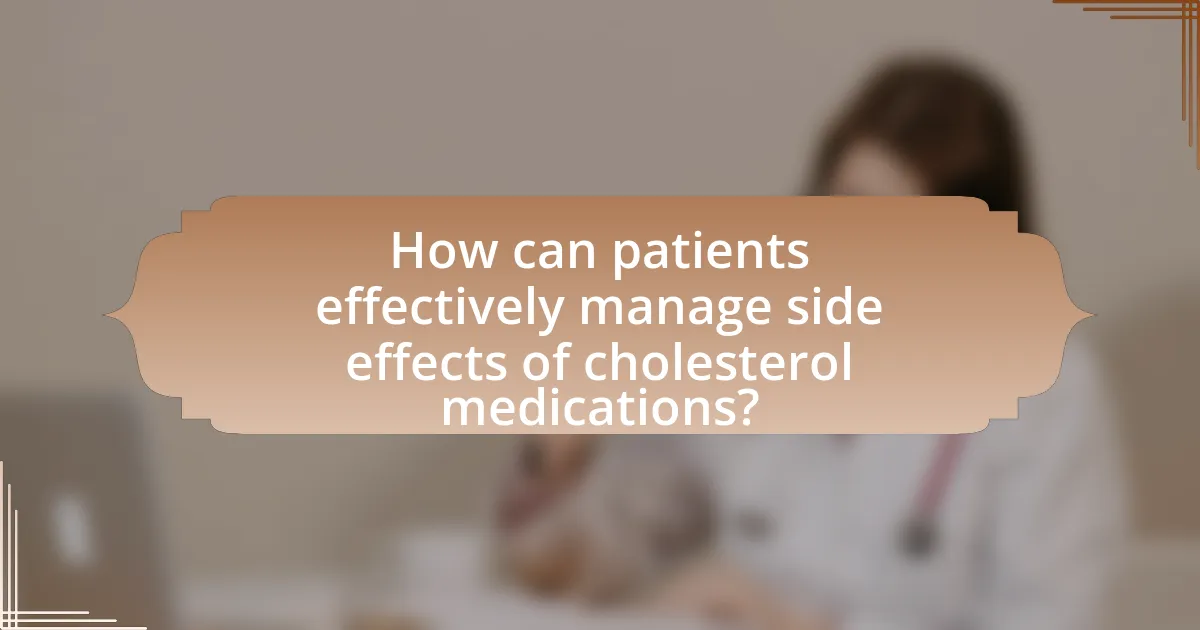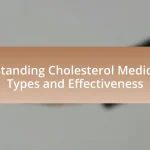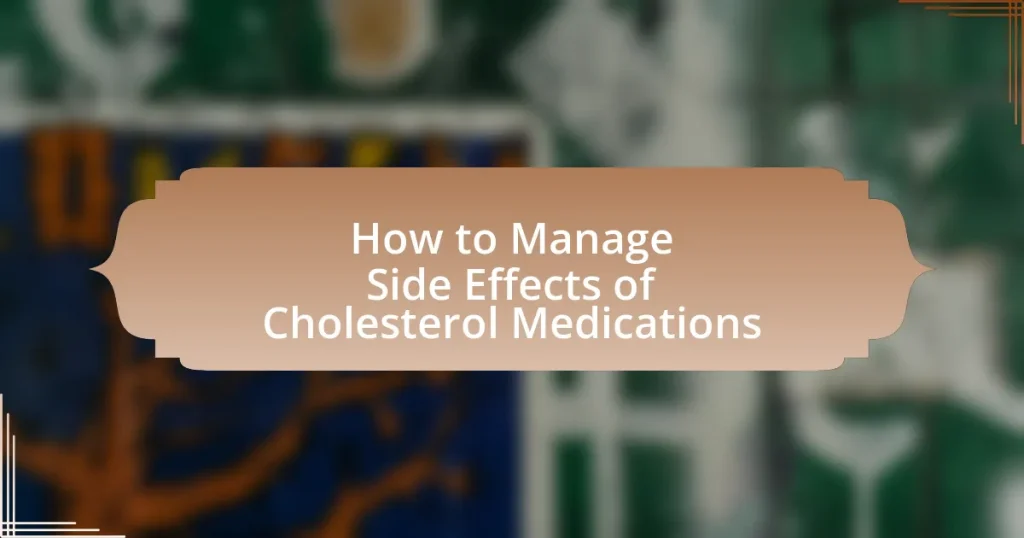The article focuses on managing the side effects of cholesterol medications, particularly statins, bile acid sequestrants, and PCSK9 inhibitors. It outlines common side effects such as muscle pain, liver damage, digestive issues, and increased blood sugar levels, emphasizing the importance of discussing these risks with healthcare providers. The article also explores how different medication types influence side effects, the significance of lifestyle changes in mitigating these effects, and strategies for effective communication with healthcare professionals. Additionally, it highlights the necessity of managing side effects to ensure medication adherence and prevent serious health complications.

What are the common side effects of cholesterol medications?
Common side effects of cholesterol medications include muscle pain, liver damage, digestive problems, and increased blood sugar levels. Statins, a widely prescribed class of cholesterol-lowering drugs, can cause muscle-related issues in about 10% of users, leading to symptoms such as soreness or weakness. Liver damage, although rare, can occur, necessitating regular monitoring of liver enzymes. Digestive issues, including nausea and diarrhea, are also reported by some patients. Additionally, statins may raise blood sugar levels, potentially increasing the risk of type 2 diabetes, particularly in individuals already at risk. These side effects highlight the importance of discussing potential risks with healthcare providers when considering cholesterol medications.
How do different types of cholesterol medications affect side effects?
Different types of cholesterol medications affect side effects in various ways due to their mechanisms of action. Statins, for example, commonly cause muscle pain and liver enzyme elevations, affecting approximately 10-20% of users. In contrast, bile acid sequestrants may lead to gastrointestinal issues such as constipation and bloating, impacting around 5-10% of patients. Additionally, PCSK9 inhibitors generally have a lower incidence of side effects, with most patients experiencing mild reactions like injection site reactions. This variability in side effects is influenced by the specific pharmacological properties of each medication class, which can lead to different tolerability profiles among patients.
What side effects are associated with statins?
Statins are associated with several side effects, including muscle pain, liver damage, digestive problems, and increased blood sugar levels. Muscle pain, or myopathy, occurs in approximately 5-10% of patients taking statins, while liver enzyme elevations can occur in about 1-3% of users. Digestive issues such as nausea and diarrhea are also reported, affecting a minority of patients. Additionally, statins may lead to a slight increase in the risk of developing type 2 diabetes, with studies indicating that this risk is about 0.2% to 0.4% higher compared to non-users.
What side effects can occur with bile acid sequestrants?
Bile acid sequestrants can cause gastrointestinal side effects, including constipation, bloating, and abdominal discomfort. These medications work by binding bile acids in the intestine, which can lead to altered bowel habits. Clinical studies have shown that up to 30% of patients may experience constipation as a side effect, while others report bloating and flatulence. Additionally, these medications can interfere with the absorption of certain vitamins and medications, potentially leading to deficiencies or reduced efficacy of other treatments.
What are the potential side effects of PCSK9 inhibitors?
PCSK9 inhibitors can cause side effects such as injection site reactions, flu-like symptoms, and muscle pain. Clinical studies have reported that approximately 10% of patients experience injection site reactions, which may include redness, swelling, or itching at the site of administration. Additionally, some patients report flu-like symptoms, including fatigue and headache, while muscle pain has been noted in a smaller percentage of users. These side effects are generally mild to moderate in severity and often resolve without the need for discontinuation of therapy.
Why is it important to manage side effects of cholesterol medications?
Managing side effects of cholesterol medications is crucial to ensure patient adherence and overall treatment effectiveness. When side effects are not managed, patients may discontinue their medication, leading to uncontrolled cholesterol levels and increased risk of cardiovascular events. Studies indicate that approximately 30% of patients stop taking statins due to side effects, which can result in a 20% increase in heart attack risk. Therefore, effective management of these side effects not only improves patient compliance but also significantly reduces the likelihood of serious health complications associated with high cholesterol.
How can unmanaged side effects impact medication adherence?
Unmanaged side effects can significantly reduce medication adherence by causing patients to discontinue or skip doses of their prescribed treatments. When individuals experience adverse effects without proper management, they may perceive the medication as harmful or ineffective, leading to a lack of trust in the treatment plan. Research indicates that approximately 30% to 50% of patients with chronic conditions do not adhere to their prescribed medications due to side effects, highlighting the critical need for effective side effect management to maintain adherence and improve health outcomes.
What are the long-term consequences of ignoring side effects?
Ignoring side effects can lead to severe long-term health consequences, including the progression of underlying conditions, increased risk of complications, and diminished quality of life. For instance, patients who neglect side effects from cholesterol medications may experience muscle damage, liver dysfunction, or cardiovascular events, which can exacerbate existing health issues. Research indicates that approximately 10-15% of patients on statins report significant side effects, and failure to address these can result in non-adherence to treatment, ultimately leading to uncontrolled cholesterol levels and heightened risk of heart disease.

How can patients effectively manage side effects of cholesterol medications?
Patients can effectively manage side effects of cholesterol medications by communicating openly with their healthcare providers, adhering to prescribed dosages, and making lifestyle adjustments. Regular consultations with healthcare professionals allow for timely adjustments to medication types or dosages, which can alleviate adverse effects. Adhering to prescribed dosages ensures that patients receive the intended therapeutic benefits while minimizing side effects. Additionally, lifestyle changes such as adopting a heart-healthy diet, engaging in regular physical activity, and maintaining a healthy weight can significantly reduce the need for higher medication doses, thereby lessening potential side effects. Studies indicate that lifestyle modifications can lead to a 10-20% reduction in cholesterol levels, which may decrease reliance on medications and their associated side effects.
What lifestyle changes can help mitigate side effects?
Adopting a heart-healthy lifestyle can significantly mitigate side effects associated with cholesterol medications. Key changes include maintaining a balanced diet rich in fruits, vegetables, whole grains, and healthy fats, which can help lower cholesterol levels and reduce medication-related side effects. Regular physical activity, such as at least 150 minutes of moderate exercise per week, has been shown to improve cardiovascular health and enhance the effectiveness of cholesterol medications. Additionally, managing stress through techniques like mindfulness or yoga can alleviate some side effects, as stress can exacerbate health issues. Studies indicate that these lifestyle modifications not only improve overall well-being but also enhance the efficacy of cholesterol-lowering treatments, thereby reducing the likelihood of adverse effects.
How does diet influence the side effects of cholesterol medications?
Diet significantly influences the side effects of cholesterol medications by affecting drug metabolism and overall health. For instance, a diet high in saturated fats can exacerbate the side effects of statins, such as muscle pain and liver enzyme elevation, while a diet rich in omega-3 fatty acids may mitigate these effects. Research indicates that individuals consuming a Mediterranean diet, which emphasizes fruits, vegetables, whole grains, and healthy fats, report fewer side effects from cholesterol-lowering medications compared to those on a standard diet. This correlation suggests that dietary choices can directly impact the efficacy and tolerability of cholesterol medications.
What role does exercise play in managing these side effects?
Exercise plays a crucial role in managing the side effects of cholesterol medications by improving overall cardiovascular health and reducing symptoms such as muscle pain and fatigue. Regular physical activity enhances blood circulation, which can alleviate discomfort associated with statin use, a common class of cholesterol-lowering drugs. Studies indicate that engaging in moderate exercise, such as walking or cycling, can lead to a significant reduction in muscle-related side effects, with research published in the Journal of the American College of Cardiology showing that patients who exercised regularly reported fewer adverse effects compared to sedentary individuals. Additionally, exercise contributes to weight management and improves lipid profiles, further supporting the effectiveness of cholesterol medications.
What over-the-counter remedies can assist with side effects?
Over-the-counter remedies that can assist with side effects of cholesterol medications include simethicone for gas and bloating, diphenhydramine for allergic reactions, and ibuprofen or acetaminophen for pain relief. Simethicone effectively reduces gas discomfort by breaking up gas bubbles in the digestive tract, while diphenhydramine can alleviate mild allergic reactions that may occur as a side effect. Additionally, ibuprofen and acetaminophen are commonly used to manage pain, which can be a side effect of certain cholesterol medications. These remedies are widely available and have been shown to provide symptomatic relief for patients experiencing side effects from cholesterol treatments.
Which supplements are known to alleviate specific side effects?
Certain supplements are known to alleviate specific side effects associated with cholesterol medications. For example, omega-3 fatty acids can help reduce triglyceride levels and may alleviate muscle pain, a common side effect of statins. Coenzyme Q10 (CoQ10) is also recognized for its potential to reduce muscle-related side effects linked to statin use, as it plays a role in energy production in muscle cells. Additionally, fiber supplements, such as psyllium, can help manage gastrointestinal issues that may arise from cholesterol-lowering medications. These supplements have been studied for their effectiveness in mitigating side effects, providing a supportive approach for individuals undergoing cholesterol treatment.
How can hydration impact the experience of side effects?
Hydration can significantly influence the experience of side effects from cholesterol medications by affecting the body’s ability to metabolize and eliminate these drugs. Adequate hydration helps maintain optimal kidney function, which is crucial for the excretion of medication metabolites and toxins. Research indicates that dehydration can exacerbate side effects such as muscle cramps, fatigue, and gastrointestinal issues, as the body struggles to process the medication efficiently. For instance, a study published in the Journal of Clinical Lipidology found that patients who maintained proper hydration reported fewer adverse effects while on statin therapy compared to those who were dehydrated. Thus, ensuring sufficient fluid intake can mitigate the severity and frequency of side effects associated with cholesterol medications.

When should patients consult their healthcare provider about side effects?
Patients should consult their healthcare provider about side effects when they experience severe or persistent symptoms that interfere with daily activities or cause significant discomfort. This includes symptoms such as extreme fatigue, muscle pain, or any unusual changes in health status. According to the American Heart Association, timely communication with a healthcare provider can lead to adjustments in medication or dosage, ensuring better management of side effects and overall treatment efficacy.
What symptoms warrant immediate medical attention?
Symptoms that warrant immediate medical attention include chest pain, difficulty breathing, severe headache, sudden weakness or numbness, confusion, and signs of an allergic reaction such as rash, itching, or swelling. These symptoms indicate potentially life-threatening conditions such as heart attack, stroke, or severe allergic reactions, which require prompt evaluation and treatment. According to the American Heart Association, recognizing these symptoms early can significantly improve outcomes in emergency situations.
How can patients differentiate between mild and severe side effects?
Patients can differentiate between mild and severe side effects by assessing the intensity and impact of their symptoms. Mild side effects typically include symptoms such as slight nausea, mild headache, or minor fatigue, which do not significantly interfere with daily activities. In contrast, severe side effects may present as intense pain, persistent vomiting, or symptoms indicating serious conditions like liver damage or allergic reactions, which require immediate medical attention. For example, if a patient experiences jaundice or severe abdominal pain, these are indicators of severe side effects that necessitate contacting a healthcare provider promptly.
What questions should patients ask their healthcare provider regarding side effects?
Patients should ask their healthcare provider the following questions regarding side effects of cholesterol medications: “What are the common side effects I might experience?” This question helps patients understand what to expect. Additionally, patients should inquire, “How can I manage or alleviate these side effects?” This allows for proactive strategies to minimize discomfort. Another important question is, “Are there any serious side effects I should be aware of?” Knowing this can help patients recognize when to seek immediate medical attention. Lastly, patients should ask, “How do these side effects compare to the benefits of the medication?” This question aids in weighing the risks and benefits of continuing treatment.
How can patients prepare for a discussion about side effects during appointments?
Patients can prepare for a discussion about side effects during appointments by compiling a list of all medications they are currently taking, including over-the-counter drugs and supplements. This preparation allows healthcare providers to assess potential interactions and side effects more accurately. Additionally, patients should note any side effects they have experienced, including their severity and duration, which helps in evaluating the impact of cholesterol medications. Research indicates that patients who actively engage in their healthcare discussions report better outcomes, as they provide valuable information that can guide treatment adjustments.
What are some best practices for managing side effects of cholesterol medications?
To manage side effects of cholesterol medications effectively, patients should communicate openly with their healthcare provider about any adverse effects experienced. This practice allows for timely adjustments to medication types or dosages, which can alleviate discomfort. Additionally, maintaining a healthy diet rich in fruits, vegetables, and whole grains can help mitigate side effects, as certain foods may enhance the effectiveness of the medication and reduce gastrointestinal issues. Regular physical activity is also recommended, as it can improve overall cardiovascular health and potentially lessen side effects. Studies indicate that lifestyle modifications, such as diet and exercise, can significantly enhance the efficacy of cholesterol medications while minimizing adverse effects.
How can keeping a side effect diary help in managing symptoms?
Keeping a side effect diary helps in managing symptoms by allowing individuals to track and identify patterns related to their cholesterol medication side effects. This systematic documentation enables patients to correlate specific symptoms with medication intake, dosage changes, or lifestyle factors, facilitating informed discussions with healthcare providers. Research indicates that patients who actively monitor their symptoms can better manage their treatment plans, leading to improved adherence and overall health outcomes. For instance, a study published in the Journal of Clinical Lipidology found that patients who maintained a symptom diary reported a 30% increase in their ability to manage side effects effectively.
What strategies can enhance communication with healthcare providers about side effects?
To enhance communication with healthcare providers about side effects, patients should prepare a detailed list of their symptoms and medication history before appointments. This strategy allows for clear and concise communication, enabling healthcare providers to better understand the patient’s experience and tailor their advice accordingly. Research indicates that patients who actively engage in their healthcare discussions, including sharing specific side effects, report improved satisfaction and outcomes (Kessels, 2003, “Patient-Provider Communication: A Review of the Literature,” Patient Education and Counseling). Additionally, utilizing open-ended questions during consultations can facilitate a more in-depth dialogue, ensuring that all concerns are addressed.










